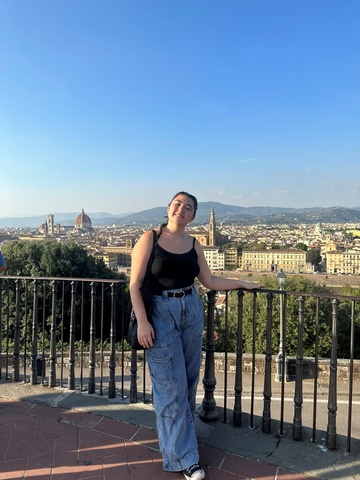
Before you decide whether you want to study abroad, people are going to give you a lot of advice. They’ll tell you how to save money, how to pack, and how to choose where to study. They’ll tell you what languages are difficult to learn, what food you should try or what to avoid, and what the people are like in Paris, Cairo, and Tokyo. They’ll tell you about pickpockets and then they’ll tell you about unbelievable beauty. They’ll tell you that it’ll be scary and difficult and worth it.
And I’m not here to dissuade you from taking any advice that anyone offers. If anything, I’m doing the exact same thing. The only thing I ask is: are you prepared to be uncomfortable?
I decided to study abroad in Florence because Iowa City, for all of its virtues, is still a college town in the Midwest. I’m a mixed-race queer kid from Chicago, so I couldn’t help but look around at Iowa and think, rather crudely, “This is great, but where’s the rest of it?”. So, I thought that leaving the country would “broaden my horizons” like everyone says, but I don’t think I was prepared for what that would look like. Because when I went to Florence, I was expecting it to feel like I had stepped into a new, better world. A world where I could go back to Iowa City and tell all of my friends how amazing Europe was and how much better it was than America, but it’s trickier than that.
I’ll admit, a lot of it did feel better. When I got sick, I never had to pay more than ten euros for a doctor’s visit—if that. When I was bored, I went to a museum and saw Renaissance pieces that I couldn’t have imagined ever being so close to. When I walked through the streets, people played music that my new friends and I would dance along to. In a lot of ways, it is actually like all of the compilations and pictures people post.
But you’re not going to escape your discomfort.
The language barrier, your identity, and your American-ness—a trait you probably didn’t even realize you had—will feel like it’s constantly being observed and critiqued. You’re not vacationing where you study abroad, you’re living and working there. You will be constantly learning, translating, and growing. It will feel as if, by the end of it, you are all of the things you never even considered possible.
"Broadening your horizons can sometimes be a cheap phrase, but an accurate one, nonetheless. Being abroad doesn’t mean entering a new world, it means that your idea of the world itself expands. That type of experience teaches you a lot about people and also yourself."
And there’s a lot of stuff you’ll learn that you will not like. For a lot of you, you’ll find out just how American you really are. From the foods you miss to the lack of geography you know (but maybe that’s just me projecting), and some of the more playful locals will remind you of it. It will be an adjustment, just how much of an outsider you are. No matter how alienated you may feel in Iowa City, it will be a whole new level outside of America just from the pure unfamiliarity of it.
If you’re still interested, though, I’m going to be just like the people I told you about at the beginning of this. The only valuable piece of advice I can give you, as someone who got home a little over a month ago: spending three and a half months abroad, trying to speak a new language around a bunch of people whom you would’ve never met outside of this, changes you. Let it.
I’m not exactly making homemade pasta and speaking fluent Italian at home, but I am different. So, just like all of the people I warned you about, I’m telling you that it’ll be scary. It’ll be difficult. And it’ll be worth it.
The Global Access Ambassador Scholarship program provides awards to study abroad for a summer, semester, or academic year. The scholarships are intended to support students who study abroad with the intent to serve as Global Access Ambassadors upon return to the UI campus. Upon completion of the study abroad program and return to UI, award recipients are asked to submit a photo and an open letter to prospective students or suggest an alternate means of sharing with prospective students.
Please note that the opinions and views expressed by ambassadors are solely those of the students and do not reflect or represent the views of International Programs or the University of Iowa.
International Programs (IP) at the University of Iowa (UI) is committed to enriching the global experience of UI students, faculty, staff, and the general public by leading efforts to promote internationally oriented teaching, research, creative work, and community engagement. IP provides support for international students and scholars, administers scholarships and assistance for students who study, intern, or do research abroad, and provides funding opportunities and grant-writing assistance for faculty engaged in international research. IP shares their stories through various media, and by hosting multiple public engagement activities each year.
